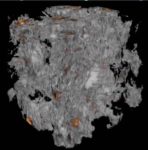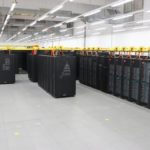In this visualization, LRZ presents the largest interstellar turbulence simulations ever performed, unravelling key astrophysical processes concerning the formation of stars and the relative role of magnetic fields. “Besides revealing features of turbulence with an unprecedented resolution, the visualizations brilliantly showcase the stretching-and-folding mechanisms through which astrophysical processes such as supernova explosions drive turbulence and amplify the magnetic field in the interstellar gas, and how the first structures, the seeds of newborn stars are shaped by this process.”
Intel Powers SuperMUC-NG Supercomputer at LRZ in Germany
In this video from SC18 in Dallas, Dieter Kranzlmueller from LRZ in Germany describes how Intel powers the SuperMUC-NG supercomputer. “The 19.4 Petaflop machine ranks number 8 among the fastest supercomputers in the world. SuperMUC-NG is in its start-up phase, and will be ready for full production runs in 2019. The machine, build in partnership with Lenovo and Intel, has a theoretical peak of 26.9 petaflops, and is comprised of 6,400 compute nodes based on Intel Xeon Scalable processors.”
300K-Core SuperMUC-NG System Launches at LRZ in Germany
LRZ in Germany dedicated their new SuperMUC-NG (“next generation”) supercomputer last week in Munich. Built by Lenovo, the massive system uses innovative hot-water cooling to achieve unprecedented computational power for large-scale scientific and engineering simulations.
Prof. Dieter Kranzlmueller to showcase SuperMUC-NG Supercomputer at Event in Caserta
Prof. Dieter Kranzlmueller from LRZ will give a talk entitled “Smart Scaling for High Performance Computing: SuperMUC-NG at the Leibniz Supercomputing Centre.” The event takes place Monday, June 4 at the University of Campania in Caserta, Italy. “The SuperMUC-NG supercomputer will deliver a staggering 26.7 petaflop compute capacity powered by nearly 6,500 nodes of Lenovo’s recently-announced, next-generation ThinkSystem SD650 servers.”
Radio Free HPC Says Goodbye to Net Neutrality
In this podcast, the Radio Free HPC team looks at the FCC’s move to abolish Net Neutrality regulations put in place during the Obama administration. Dan thinks this is a good move to remove unnecessary regulations, but rest of the crew is worried about where this will lead the future of the Internet.








